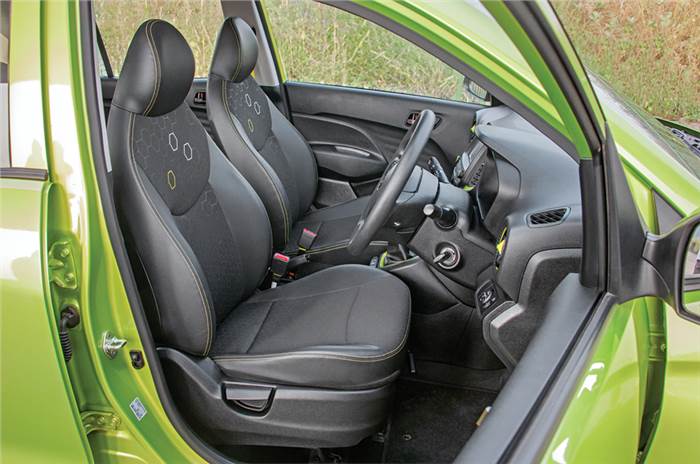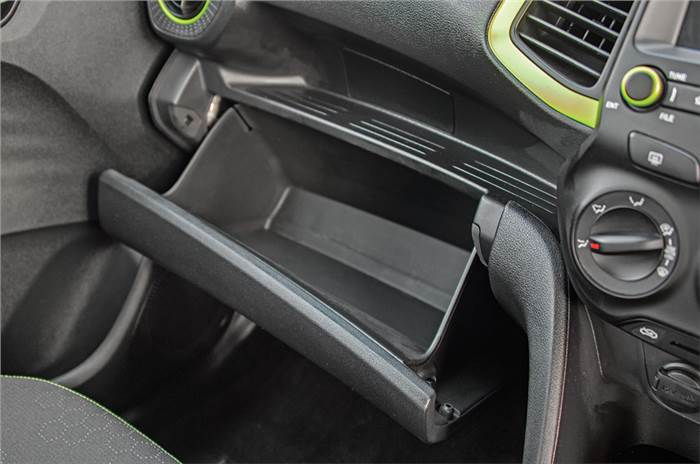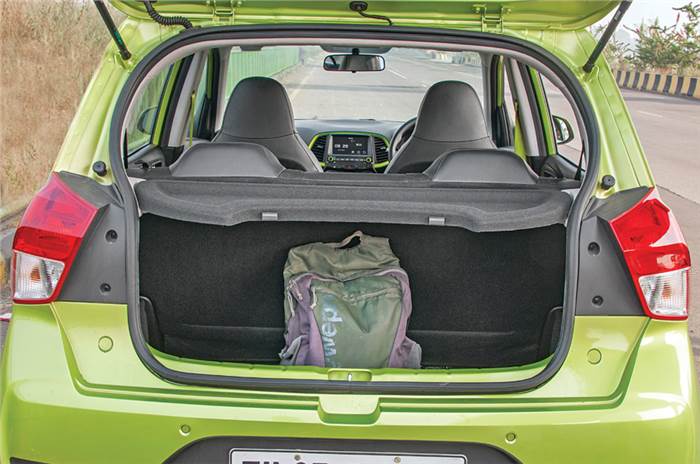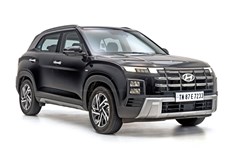2018 Hyundai Santro review, road test
The original Hyundai Santro was synonymous with practicality, ease of use and efficiency. Does the new, second-gen car live up to the legendary name?
Published on Nov 27, 2018 05:09:00 PM
82,480 Views
Follow us on

New car is wider and longer than the original Santro, and isn’t as upright in stance.

Well-finished cabin has a lot of feel-good elements. Black interior with green trim exclusive with Dana Green exterior paint.

Large windows and generous space make rear section feel airy.
You don’t quite walk into the new Santro as you would into the cabin of the original car but ingress and egress are still very convenient. The driving position is a one-size-fits-all affair. There’s no seat-height adjust and the steering position is fixed – your comfort level behind the wheel is a function of your height. Shorter drivers will like the elevated driving position, while taller drivers will find the seat set a touch too high and the steering a bit low. It’s a similar story with the front seats; they work just fine for drivers of average height but larger-framed individuals might find their perches inadequate in shoulder support, and the fixed headrests small. The high-set gear lever does fall easily to hand but the switches for the power windows at its base are out of sight and not conveniently placed. That the buttons are not even backlit makes them harder still to locate in the dark. Again, the power window cluster has been centrally placed in one unit to save costs.

The aforementioned ergonomic anomalies aside, the Santro’s cabin does score for look, feel and quality. Note, only Santros in the Dana Green exterior colour (as our test car) get all-black interiors with green detailing on or around the air-con vents, gear lever, front seatbelts, and seats. A premium-looking beige-on-black interior theme is standard with other colours, with champagne gold embellishments jazzing up the cabins on mid-spec and top-spec versions. The larger surfaces are well finished and panel fit is by and large consistent.
Like every other Hyundai, the Santro’s dashboard (with what its designers call an ‘elephant-inspired’ fascia) is well laid out and user-friendly. The infotainment system (read entertainment box) sits high up and in easy view, and is flanked by vertically oriented centre air-con vents that are easy to operate. Even richer in look are the rotary side vents that seem like they belong in a Mercedes-Benz A-class. Other nice bits include the crisp control stalks, the instruments console that features a multi-info display as standard and the good-to-hold steering wheel with its audio and phone buttons. But small compromises have been made here and there to keep costs down. There’s no chrome on the Hyundai logo on the steering, the knobs for the air-con feel a bit rudimentary, and there’s no lock/unlock button.

On a long journey, your co-passenger will miss the absence of a second cupholder up front. You do get a well-sized glovebox, there’s a well thought out shelf on the passenger’s side of the dash to keep your mobile phone, and each door houses a 1-litre bottleholder too.
At the back, the Santro is surprisingly roomy. There’s enough head- and kneeroom for a six-footer to sit in comfort, and the large windows really do allow a great view of the world outside. Seating three abreast might be a squeeze but the floor is almost flat and even the rear air-con vent isn’t too intrusive. Yes, you read that right. The Santro debuts a rear air-con vent in this segment of hatchbacks, and it does its bit to cool the cabin faster. Some might find the seatback a touch too reclined and the seat cushioning to be on the softer side, but the bigger issue is with the small headrests that simply won’t offer enough protection against whiplash injuries in the event of an impact. And that’s a shame.

Behind the rear seat is a 235-litre boot. There’s enough space for a large suitcase and you can fold the rear seat’s backrest to make space for more luggage. The loading lip is high so loading and unloading can be bothersome. What’s also irritating is that there’s no button-operated release on the tailgate; you either use the key or the boot release besides the passenger’s seat. True, these are features that are not common in this segment, but, being a Hyundai, we expected the Santro to have these conveniences.
Copyright (c) Autocar India. All rights reserved.

















Comments
Member Login
Personal Details
No comments yet. Be the first to comment.